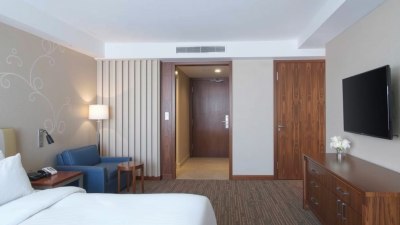What to Do When Your Hotel Room Has Zero Soundproofing
Discover effective strategies to cope with noise issues in hotel rooms.

Traveling is an exciting and enriching experience, but it can be frustrating when you find yourself in a hotel room that offers little to no soundproofing. Whether it's the bustling streets outside, thin walls separating you from noisy neighbors, or the inconsiderate actions of fellow guests, noise can significantly reduce the comfort of your stay. Fortunately, there are several strategies you can employ to soundproof your hotel room or at least mitigate the noise you experience. Here’s a comprehensive guide to help you combat noise disturbances during your travels.
Understanding Hotel Soundproofing
Before discussing solutions, it's essential to understand the common sources of noise in hotels. Noise can originate from numerous factors, including traffic, construction, elevators, and guests. Hotels vary widely in their construction quality, and not all hotels prioritize soundproofing. Many budget or mid-tier hotels may lack adequate insulation, leading to a noisy environment. Even higher-end establishments can experience noise issues depending on their location. Understanding these factors can help you select a quieter hotel in the future.
1. Choose the Right Hotel
If you're particularly sensitive to noise, it may be worth investing a little extra time and effort into selecting a hotel that prioritizes soundproofing. When booking accommodations, look for hotels that specifically advertise soundproof rooms or have received good reviews regarding noise levels. Websites that feature guest reviews can provide helpful insights into noise issues. Additionally, consider the hotel's location; establishments on quieter streets or farther from nightlife and transportation hubs are likely to be quieter.
2. Request a Quieter Room
When checking in, don’t hesitate to ask for a quieter room. Inquire about rooms located away from elevators, ice machines, or busy streets. Often, the staff will be understanding of your request and may offer you a room that experiences less noise. If you have a preference for upper floors, mention this as well; higher rooms tend to be less affected by street-level noise.
3. Use White Noise or Sound Machines
If you find yourself in a noisy environment, consider using white noise to help drown out disruptive sounds. Many smartphones come with built-in sound machines or apps that can generate calming white noise or soothing sounds like rain or ocean waves. Alternatively, portable white noise machines are also available to bring along on your travels. Placing this device near your sleeping area can create a barrier of sound that makes it easier to relax and sleep despite external disturbances.
4. Bring Earplugs
Earplugs can be a simple yet effective solution when faced with noise disturbances. There are various types of earplugs available, from disposable foam earplugs to reusable silicone ones. Some even offer higher levels of noise reduction, making it easier to ignore sounds. Make sure to bring a comfortable pair along on your travels, as they can be key to getting a good night's sleep in a noisy hotel environment.
5. Use a Sleep Mask
While a sleep mask won’t eliminate noise, it can significantly enhance your ability to relax and fall asleep. By blocking out light, a sleep mask might help signal to your brain that it’s time to sleep, improving your overall rest. Look for a mask that is comfortable and soft to ensure the best experience.
6. Rearranging the Room
If you're staying in a room with noise issues, consider rearranging the furniture if possible. Positioning larger furniture pieces, such as dressers or tables, against walls that connect to noisy neighbors can help block some sound. Additionally, utilizing any available blankets or cushions to absorb sound can have a small but possibly impactful effect. It may not completely eliminate disturbances, but it could reduce their intensity.
7. Seal Gaps and Cracks
To effectively combat noise, inspect the room for any gaps that may allow sound to enter. Check around doors and windows for significant cracks or openings. If you identify any, using a towel to block sound leaks can serve as a temporary measure. This may not be a permanent solution but can help to muffle noise during your stay.
8. Take Advantage of Amenities
If your hotel provides earplugs or white noise machines as part of their amenities, take advantage of these offerings. Hotels that prioritize guest comfort often equip rooms with tools designed to combat noise, and you should utilize them. Additionally, some hotels may provide headphones or offer streaming services that can help you find an audio distraction to keep your mind away from noise.
9. Communicate with Hotel Management
If your hotel room is excessively noisy, don’t hesitate to communicate your concerns to hotel management. Explain the situation and request assistance. They may have policies in place to accommodate guests dealing with noise issues, including offering a room change. A polite conversation can often lead to effective solutions.
10. Change Rooms
If the noise is unbearable and management cannot help, you may want to consider requesting a different room. Hotels typically have multiple rooms available, and a change may make a significant difference. By moving to a quieter location within the hotel, you increase your chances of enjoying a more peaceful stay.
11. Plan Activities Only When Necessary
Engage in activities outside your hotel room during peak noise times. Instead of returning to the room during early evening hours when noise levels are likely to be elevated, use this time to explore local attractions or socialize in common areas. Keep in mind that some hotels have designated quiet hours; utilizing your time around these can lead to a more restful experience.
12. Consider Earbuds with Noise Cancellation
Instead of regular earplugs, consider investing in wireless earbuds with noise cancellation features. These can effectively block out unwanted sounds while allowing you to listen to music or podcasts, helping you relax. They also provide the flexibility to use them while walking around the hotel, making them a versatile option for noise management.
Final Thoughts
While encountering excessive noise in hotel rooms can be frustrating, a few preparations and strategies can greatly enhance your experience. Regularly choose hotels that prioritize soundproofing, and don’t shy away from communicating your needs to hotel staff. Remember, you deserve a restful night’s sleep while traveling. By employing these tips, you can significantly reduce the impact of noise interruptions and enjoy your stay, no matter where your travels take you. Safe travels!











